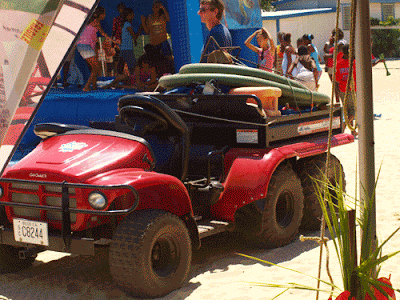( I will note at this point that last week, I spent an evening responding to that query as well writing a long missive about the food here, and then it evaporated in cyberspace or in my computer’s innards. It was frustrating after spending a evening on it, I am just now getting back to it. And this one I have created in Word, and will transfer to the site.)
What I like most about Belize is the sky. It is really incredible. We are in the rainy season, which means more clouds than usual, usually bringing rain sometime between midnight and 5 AM. I go up on the roof every night to watch distant lightning, or after my eyes have adjusted, to look up at the milky way, and millions of stars. This morning I woke up at about 5:30 and the sunrise was so spectacular I grabbed my camera and went up on the roof and shot this picture of the sunrise.

Then I looked west, and took this picture of a cloud in the west that was catching the sun.

This evening I took this picture of the sunset.

I know, I know, I’ve posted lots of sunsets and clouds on this site. And the pictures I post, while pretty, don’t really do justice when you consider that I’m only taking a picture of a small slice, although a relatively big one with the lens I’m using, but still a small part of this astonishingly beautiful scene from horizon to horizon.
About the local schools – The schools in Belize are a church-state partnership, which means no one really takes responsibility for the results. The church is either the Anglican Church or the Catholic Church, depending on the local school. But these aren’t schools connected to a local parish, they are connected to the national church in some way. The “state” is the national government.. But it gets worse.
The schools generally sit on land owned by the church. The school buildings are built by the state. The teachers are hired by the church, but are paid by the state. The teachers have to belong to the church, in part because they teach religion in the schools. The state is currently trying to start a commission to review teacher qualifications and get involved in the hiring process, but the Catholic Bishop is very resistant.
I’m not sure if the principal is hired by the church or the state. Our Rotary Club painted all sixteen classrooms in the Seine Bight school this weekend, which how I learned this info. In my discussion with the principal, I asked him if they taught evolution in science, and he replied that they encourage teachers to keep their opinions out of the classroom, which tells me that he is hired by the church.
Here is a picture of the school.

Belize is a third world country, and the primary taxes are a 10% sales tax on most things, business taxes based on gross receipts and duties on imports that can be as much as 34%.
The government struggles to build the infrastructure the country needs, and support a population, many of whom live in poverty, which includes many residents of Seine Bight. There is no such thing as local property taxes, so there is no local financial support that isn’t voluntary.
I say this because the state pays the teacher salaries, but not much else. It is up to the principal and teachers to raise funds for classroom materials. I looked at textbooks in two rooms, both were textbooks about the United States, both dated from the late 70s. The school is concrete, the rooms are boxes without anything to baffle sound, and I am sure are extremely noisy when occupied. The floors are unfinished concrete.
On the other hand, one of our clients is a family from Edmonton, Alberta, a major city in Canada. They have a daughter in the Seine Bight School, and are pleased with the education she received last year, and felt it compared favorably with Edmonton schools in many, though not all, ways.
Keila, our autoCad technician, came up through the Belizean school system, and has done well by it. I will try to remember to relate it on the near future post. And I’ll (re)write about food!

